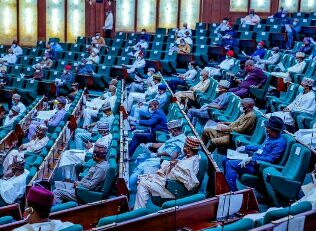House of Representatives has approved the federal government proposed total aggregate spending of N26 trillion for 2024–2026 financial years.
Of this approved sum, N10.2 trillion is for Recurrent (non-debt); Personnel Costs (MDAs) of N4.49 trillion; Special Intervention (Recurrent) is put at N200 billion; N5.9 trillion earmarked for Capital Expenditure with Special Intervention (Capital) of N7 billion and N1.3 trillion Statutory Transfers.
The House also gave nod to the planned N16.9 trillion revenue; N9 trillion budget deficit, N7.8 trillion in new borrowings (including borrowing from foreign and domestic sources).
These approvals were sequel to the consideration and adoption of the recommendations in the report of 2024–2026 Medium Term Expenditure Framework (MTEF) and Fiscal Strategy Paper (FSP) at plenary, yesterday.
The report was presented by Hon James Faleke (APC, Lagos) for the Committees on Finance, National Planning and Economic Development and Aid, Loans and Debt Management and considered by the Committee of Supply with Speaker Abbas Tajudeen as chairman and adopted in plenary.
Accordingly, the House approved the benchmark oil price of $73.96, $73.76 and $69.90 per barrel for 2024, 2025, and 2026 respectively.
It further approved the Exchange Rate of N700, N665.61 and N669.79 to $1 proposed by the Executive for the periods 2024–2026 as well as daily crude oil production of 1.78 Mbps, 1.80 Mbps, and 1.81 Mbps, for the period.
The House equally approved the GDP growth rates of 3.76%, 4.22%, and 4.78% during the years 2024, 2025, and 2026 be approved; inflation rate of 21.40% in 2024, 20.30% in 2025, and 18.60% in 2026.
Also in the approved report, the House is to investigate the N10 billion released by the Ministry of Finance for the proposed NIPOST restructuring and recapitalisation.
“All items locally produced should be rightly banned from importation and customs tariffs amended accordingly.
“The Central Bank of Nigeria should ensure that Banks have access to FOREX to provide funds to importers and other users to prevent patronage of the parallel market.
“The National Assembly began the process of amending the Fiscal Responsibility Act (FRA, 2007) to enhance the agencies’ ability to enforce fiscal responsibility and impose sanctions on erring staff. Specifically, about Sections 21 (1) and 22 (1)(2).
“The National Assembly Standing Committees take prompt action to review the laws governing the activities of all revenue-generating agencies under their purview to identify specific sections or clauses that need to be amended to plug waste and increase the government’s capacity to generate revenue.
“The Nigeria National Petroleum Corporation Limited (NNPCL) should work towards reducing its production and operational costs thereby increasing available government revenue.
“All tax waivers not directly linked to non-governmental/non-profit organizations should not be granted; and all tax waivers from 2015 to date should be investigated by the relevant Committee of the House,” the committees further recommend.
Presenting the report, the Finance Committee chairman Faleke observed that despite the deficit budget, the proposed tax waivers to be granted in 2024 are N 2.7 trillion, 2025 is N 3.2 trillion and 2026 is 3. 8 trillion.
These, he said constituted 30 percent of the total fiscal deficit for 2024, 31 percent for 2025 and 32 percent for 2026.




